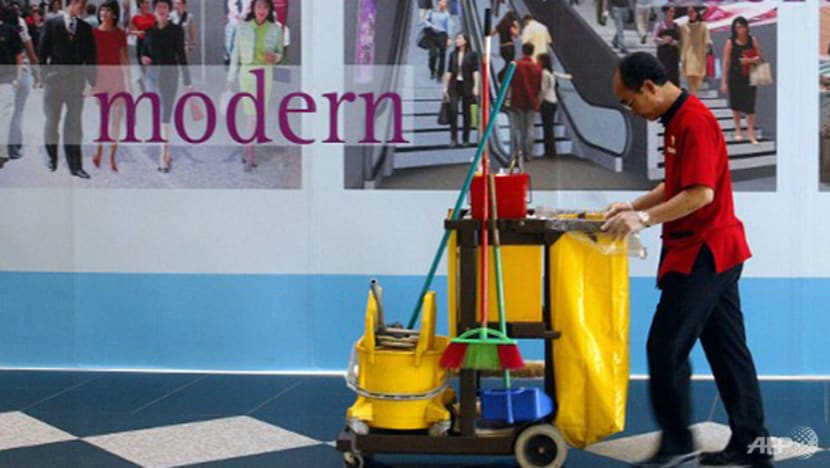commentary Singapore
Commentary: We expect good service, but are we good customers?
A video showing a customer shouting at employees at a McDonald’s outlet at Hougang Mall last week suggests we need to tackle customer behaviour towards service staff, says Channel NewsAsia’s Bharati Jagdish.

The man (dressed in a black T-shirt) was filmed shouting at McDonald's staff. (Screenshot: Facebook/Kyros Lim)
SINGAPORE: We often complain about bad customer service, but it’s time to take a cold hard look at whether we’re even deserving of good customer service.
A viral video showing a customer shouting at staff at a McDonald’s outlet in Hougang Mall drew the ire of many Singaporeans last week.
Almost everyone was united in condemning the man’s actions and in commending the patience of the counter staff.
Netizens described his behaviour as deplorable.
Even apologies did not placate him.
At one point he said, “I want to see what action you all do to her” indicating he wished retribution upon the staff for the perceived service lapse.
In response to media queries, a McDonald’s spokesperson said: “While our employees strive to do their best every day to serve our customers with care, we also hope that any unintended misunderstandings can be resolved amicably.”
"We believe that under any circumstance, our employees - just like any human being - should be treated with respect, and do not deserve to be shouted at in the manner as portrayed in the video."
This response in itself is commendable.
The establishment is standing up for its employee and rightfully saying that the days of “the customer is always right” are over.
Over the years, we have seen several examples of abuse of those in the service industry.
A video of a customer verbally abusing a taxi driver went viral in 2015. He called the driver names like "blind bat” and complained rudely about a myriad things including the speed at which the cabby was driving.

Because of several instances of bad behaviour, even hospitals today have had to put up signs warning patients and their families not to verbally or physically abuse their staff.
Granted, the cases that make headlines tend to be extreme - where customers seemed to overreact to minor misunderstandings and could not be placated in spite of the staff’s efforts.
However, in day-to-day interactions, many other customers are rude in subtler ways.
Words such as “please” and “thank you” seem to elude us, even if the service provider is providing tip-top service.
Getting acknowledgement or a smile from customers can be likened to pulling teeth, according to some in the industry.
NO EXCUSE FOR ABUSE
Often customers say they are brusque and impatient only because service staff aren’t up to the mark.
It’s common to encounter service staff who can’t communicate clearly, lack product knowledge or manners, and it can be frustrating to be on the receiving end of bad service.
But even if we receive service that we consider wanting, let’s remember that there are better ways of expressing our dissatisfaction. There’s no point being rude, losing our temper and resorting to verbal or physical abuse, especially if the person across from us is trying to remedy the situation.
Most businesses have feedback channels. Why not use them?
Companies that recognise the importance of superior customer service to their bottomline will take steps to address problems.
It also wouldn’t hurt to use these feedback channels to convey praise of outstanding service staff when we encounter them. Let’s not be quick to complain and slow to compliment.

POOR SALARIES, A LACK OF PRIDE AND BAD CUSTOMERS
In the recent McDonald’s case, the service staff seemed beyond reproach. They managed to maintain their patience even in the face of an ugly tirade.
In other cases, those of us who use unsatisfactory service as an excuse to be bad customers in the first place also need to recognise the various reasons for a disappointing service culture.
Many have cited the generally low salaries in the industry and the possibility that many don’t take pride in their jobs.
These are certainly issues that must be addressed.
A bad service experience can hurt a business, so business owners need to realise that investing in their staff – not just in terms of training, but remuneration – is crucial.
Some have said customers must understand that in order to get good service, we need to be willing to pay more for products and services in general so that money can be channelled to salaries within the industry. This may very well be true in some instances which is why we too need to manage our expectations.
In some situations, we merely expect a transactional relationship with service staff and in others where we pay premium prices, we are right to expect more, but even then if our expectations aren’t met, there’s no sense in resorting to verbal or physical abuse.
Let’s recognise that service staff too could be having a bad day and that they are human, hence will sometimes make mistakes. Often, it’s not the frontline staff’s fault. It could be an issue related to the establishment’s policies, in which case taking your frustrations out on frontline staff would be futile.
Generations of individuals who see service as servitude have also propagated a lack of pride in such jobs.
Key to tackling this is customers’ attitudes towards service staff.
How can we expect good service in an environment where many customers themselves show no respect for those who provide that service.
Do we also unconsciously lack respect for service staff because we consider their jobs less important by virtue of the fact that these jobs can be low-paying?

Yet, when we get bad service, we take it seriously and it could ruin our day. Doesn’t this indicate that the jobs those in customer service do are in fact, vital and deserve our utmost respect?
In spite of all this negativity, many service staff continue to provide great service even to grumpy and ungrateful customers.
Shouldn’t this be enough for us to check our own behaviour as customers, even if we’re having a bad day?
It can be challenging. I myself have been short with service staff because I’ve had a bad day at work. Awareness is the first step. The next step is to modify that behaviour.
It’s not rocket science.
Good customers can motivate staff to go the extra mile, which could attract more to the industry.
SOCIAL PRESSURE AS A MORAL TOOL
Another facet of this issue is what actions are taken by those who witness bad customer behaviour.
Some netizens reacting to the viral video of a customer verbally abusing McDonald’s staff recently pointed out that no one in the vicinity came forward to intervene.
In the face of bad customer behaviour, social pressure can be a great moral tool to get the abuser to stop.
We could do more by calling out such behaviour immediately to arrest it instead of merely filming it to post for online vigilantes to comment on.

When extreme cases of bad customer behaviour go viral, it’s crucial to use these as teaching moments for ourselves and our children, but let’s go a step further to encourage action.
Fear is understandable. What if the abuser turns on you instead? We have seen several cases of this too.
But if enough of us do calmly and collectively all at the same time, the bullying is likely to stop.
It’s time to push past our apprehensions and stand up collectively in the face of such incidents.
HOLDING A MIRROR UP TO SOCIETY
Fair salaries and customer service training are key to improving service culture, but equally vital is customer behaviour.
We have several measures of customer service in Singapore. Perhaps it’s time to have more indices to measure customers’ behaviour and attitudes towards service staff.
Hearing from service staff and their challenges with customers could be one way of holding a mirror up to society.
Most of all, each of us needs to consciously act on what we see in order to create a positive service culture, one that is a virtuous circle of mutual respect regardless of whether you are service professional or a customer.
Bharati Jagdish is the host of Channel NewsAsia Digital News' hard-hitting On The Record, a weekly interview with thought leaders across Singapore, and The Pulse, Channel NewsAsia’s weekly podcast that discusses the hottest issues of the week.










